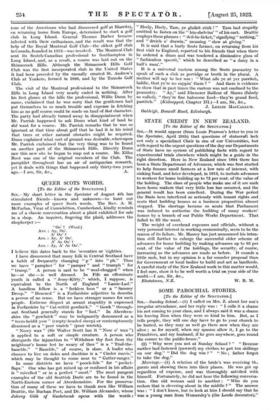QUEER SCOTS WORDS.
[To the Editor of the SPECTATOR.] Sin,—My short letter in the Spectator of August 4th has
stimulated friends—known and unknown—to hunt out more examples of queer Scots words. The Rev. A. M.
MeFo.rlan, Vicar of Cunewhitton, Cumberland, kindly reminds me of a classic conversation about a plaid exhibited for sale in a shop. An inquirer, fingering the plaid, addresses the shopkeeper "00' I (Wool.)
Ass.: Ay, Oo'.
A' Oo' Ass. : Ay, A' Oo'. A' Ac Oo'
ANS. : Ay, A' Ae Oo'."
I believe this dates back to the 'seventies or 'eighties.
I have discovered that many folk in Central Scotland have a habit of frequently changing " p " into "ph." Thus we have " pampher " for " pamper " and " trumph " for "trump." A person is said to be " wed-chugged " when he—or she — is well dressed. In Fife an effeminate youth is called a " Jessy-Kitty," which, I suppose, is equivalent to the North of England "Lassie-Lad." A handless fellow is a "feckless loon" or a "Sammy
Dreep." " Dozened " is a Forfarshire adjective to describe a person of no sense. But we have stronger names for such people. Extreme disgust at arrant stupidity is expressed in Forfarshire by" Cat-wittit gowfnick." " Gowk " through- out Scotland generally stands for "fool." In Aberdeen- shire the " gowfnick " may be indignantly denounced as a " teem-heidit yow " (empty-headed sheep) or contemptuously dismissed as a "peer vratch " (poor wretch).
"Nosey wax" (Sir Walter Scott has it "Nose o' wax ") is applied to a soft or simple creature. A person who disregards the injunction to "Withdraw thy foot from thy neighbour's house lest he weary of thee" is a " Trail-the- bauchle." " Bauchle," of course, is shoe. A loafer who chooses to live on doles and dustbins is a "Cinder mavis," which may be thought to come near to "Gutter-ranger."
In some districts we have " pooch-lids " for "pocket- flaps." One who has got mixed up or confused in his affairs is " raivelled " or in a perfect " snorl." The most pungent examples -of the old Scottish Doric are to be found in the North-Eastern corner of Aberdeenshire. For the preserva- tion of many of these we have to thank men like William Beattie, the Buchan Poet, and Dr. William Alexander, whose Johnny Gibb of Gushetneuk opens with the words ;
" Heely, Heely, Tam, ye glaikit stirk ! " Tarn had stupidly omitted to fasten on the " hin-shelvins' " of his cart. Beattie employs these phrases : "dell-be-ticket," signifying" nothing," and " dreich o' drawin," meaning "slow at giving."
It is said that a burly Scots farmer, on returning from his first visit to England, reported to his friends that when there he ordered a dram and was tendered a diminutive glass of " fushiordess speerit," which he described as "a daisy in a bull's mou'."
It is a universal custom among the Scots peasantry to speak of such a dish as porridge or broth in the plural. A mother will say to her son : "What ails ye at yer parritch, laddie, that ye're no suppin' them ? " And there is evidence to show that in past times the custom was not confined to the peasantry. "Ay," said Ebenezer Balfour of Shaws (falsely so called), "they're fine halesome food—they're grand food, parritch." (Kidnapped, Chapter III.)—I am, Sir, &c., J. LESLIE MA.CCALLIIM.
Oakkigh, Boswall Road, Edinburgh.


































 Previous page
Previous page